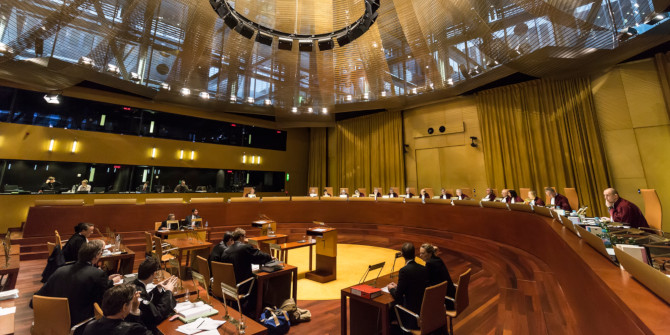The European Parliament plays an important role in shaping EU trade policy. Robert Basedow and Julian Hörner present new research on the factors that influence the voting behaviour of MEPs on trade-related issues.
What drives support among Members of the European Parliament (MEPs) for trade liberalisation? This question has received only scant attention among scholars of EU trade policy and international political economy, which is remarkable.
On the one hand, the European Parliament is a co-ratifier and co-legislator in EU trade policy and thus decisively shapes policy outcomes including trade agreements. On the other hand, EU trade policy and agreements have a significant impact on world markets and the global trade regime. The EU is widely seen as a trade superpower – alongside the United States and China – which plays a crucial role in global economic governance. The voting behaviour of MEPs, in other words, matters both for the European and the world economy.
Trade-related votes in the European Parliament
In a new study, we seek to shed light on the drivers of MEP voting on trade liberalisation through a novel systematic statistical evaluation. We compile a dataset that records how MEPs voted in all trade-related votes coming under the purview of the International Trade (INTA) Committee from 2009 to 2019. Drawing on the political economy literature on the determinants of trade liberalisation, we develop and test three theoretical explanations for when MEPs may – or may not – vote for trade liberalisation in the form of liberal legislative proposals or trade agreements that remove tariff or non-tariff barriers to trade and investment flows.
First, political economists have long theorised that regional economic conditions in electoral districts shape the likelihood of parliamentarians voting for trade liberalisation. Parliamentarians representing highly competitive regions may expect trade liberalisation to benefit their constituencies and thus lend support to relevant legislative proposals and trade agreements.
Parliamentarians representing less competitive regions may worry that trade liberalisation hurts their constituencies through income losses and increased unemployment and therefore vote against trade liberalisation. Hence, we theorise that MEPs from European regions with strong economic fundamentals are more supportive of trade liberalisation than MEPs from economically weak regions.
Second, scholars of the European Parliament have emphasised the importance of political ideology for MEP voting behaviour. Qualitative research – drawing on single or small comparative case studies of the European Parliament’s involvement in trade negotiations and ratification procedures – seems to support this perception of MEPs as strongly ideological actors. We therefore predict that MEPs’ positions on the classic/left right, pro/anti-EU and economic liberalism/protectionism axes decisively shape their voting on trade liberalisation.
Last, following the considerable public salience and contestation of recent trade negotiations notably between the EU, United States and Canada, scholars of EU trade policy have suggested that variation in politicisation may affect MEP support for trade liberalisation. We theorise that politicisation – measured through variation in media coverage of EU trade agreements across member states – erodes support for trade liberalisation. We further assume that politicisation interacts with and amplifies the effects of economic and ideological variables on MEP voting behaviour.
At times of high politicisation, in other words, we expect Eurosceptic MEPs from economically weak regions to be even less likely to vote for trade liberalisation whereas we expect Europhile MEPs from economically strong regions to become even more supportive. The underlying assumption is that politicisation increases voter interest in MEP behaviour as well as MEP efforts to appear accountable to voters. However, it is important to note that an electoral connection at the regional level cannot be assumed in the EU context.
Results of the analysis
We find that ideological variables have the strongest effects on MEP support for trade liberalisation. MEPs from Europhile, right-wing and economically liberal parties are more likely to vote for trade liberalisation than MEPs from Eurosceptic, left-wing and protectionist parties. Further, we find that economic variables have no effect or a weak impact on MEP support for trade liberalisation. Regional unemployment rates have a significant yet relatively small negative effect on MEP support for trade liberalisation, whereas regional employment in agriculture has – to our surprise – a positive effect.
What are the broader ramifications of our research? First, our findings confirm previous qualitative research on EU trade policy that depicts the European Parliament as a political institution driven predominantly by ideological and normative considerations rather than economic interests. This suggests that the Parliament is most likely to affect outcomes of trade negotiations and the EU’s bargaining position vis-à-vis third countries with regard to “ideological” non-trade issues – such as democracy and human rights promotion or environmental and climate protection – rather than market access provisions.
Second, our findings expose a flaw in political economy research on trade policy. The US-centric literature assumes strong personal ties between the electorate and parliamentarians, who thus should be responsive to regional economic interests. However, in the EU context – and indeed in many proportional electoral systems – this personal accountability relationship is less developed than in majoritarian systems, which likely explains the limited responsiveness of MEPs to regional economic conditions. As the European Parliament decisively shapes EU trade policy and the EU is a key player in the global trade regime, these findings cannot be discarded as a mere outlier but require us to reconsider our vision of parliaments in political economy models of trade policy.
Last, many of the effects that we observe are weak and depend on model specifications, which suggests that additional research is needed to solidify our understanding of MEP voting on trade liberalisation and policy.
For more information, see the authors’ accompanying paper at the Journal of European Public Policy
Note: This article gives the views of the authors, not the position of EUROPP – European Politics and Policy or the London School of Economics. Featured image credit: Leonid Andronov/Shutterstock.com



